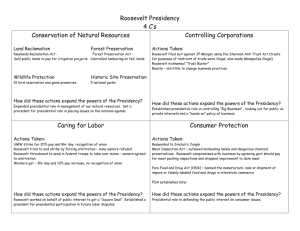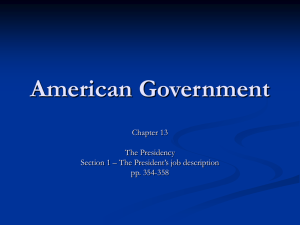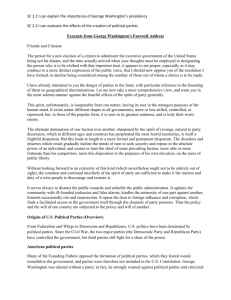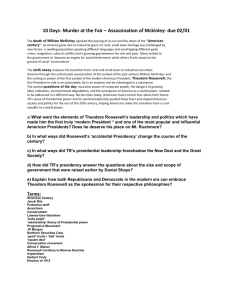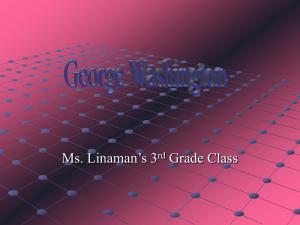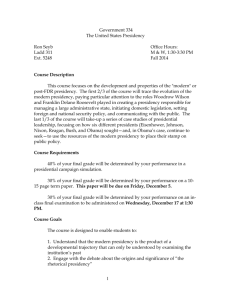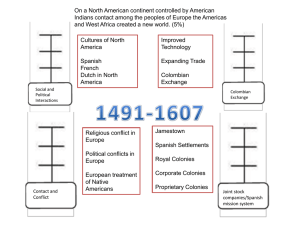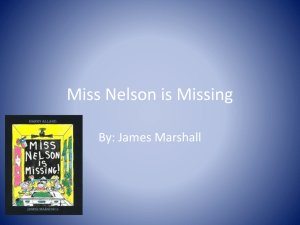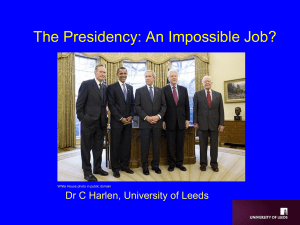Syllabus
advertisement
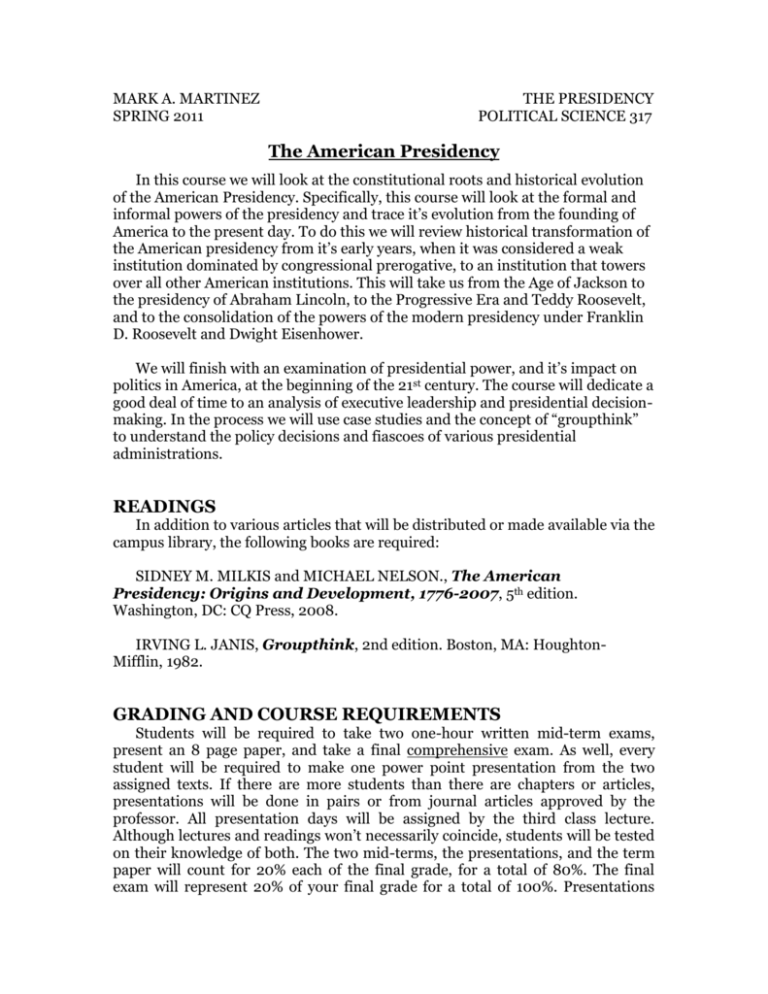
MARK A. MARTINEZ SPRING 2011 THE PRESIDENCY POLITICAL SCIENCE 317 The American Presidency In this course we will look at the constitutional roots and historical evolution of the American Presidency. Specifically, this course will look at the formal and informal powers of the presidency and trace it’s evolution from the founding of America to the present day. To do this we will review historical transformation of the American presidency from it’s early years, when it was considered a weak institution dominated by congressional prerogative, to an institution that towers over all other American institutions. This will take us from the Age of Jackson to the presidency of Abraham Lincoln, to the Progressive Era and Teddy Roosevelt, and to the consolidation of the powers of the modern presidency under Franklin D. Roosevelt and Dwight Eisenhower. We will finish with an examination of presidential power, and it’s impact on politics in America, at the beginning of the 21st century. The course will dedicate a good deal of time to an analysis of executive leadership and presidential decisionmaking. In the process we will use case studies and the concept of “groupthink” to understand the policy decisions and fiascoes of various presidential administrations. READINGS In addition to various articles that will be distributed or made available via the campus library, the following books are required: SIDNEY M. MILKIS and MICHAEL NELSON., The American Presidency: Origins and Development, 1776-2007, 5th edition. Washington, DC: CQ Press, 2008. IRVING L. JANIS, Groupthink, 2nd edition. Boston, MA: HoughtonMifflin, 1982. GRADING AND COURSE REQUIREMENTS Students will be required to take two one-hour written mid-term exams, present an 8 page paper, and take a final comprehensive exam. As well, every student will be required to make one power point presentation from the two assigned texts. If there are more students than there are chapters or articles, presentations will be done in pairs or from journal articles approved by the professor. All presentation days will be assigned by the third class lecture. Although lectures and readings won’t necessarily coincide, students will be tested on their knowledge of both. The two mid-terms, the presentations, and the term paper will count for 20% each of the final grade, for a total of 80%. The final exam will represent 20% of your final grade for a total of 100%. Presentations represent 20%, for a total of 100%. Note: Two (2) points will be deducted from your term paper if you miss or are not present from on the day your colleagues are making their presentations. Five points (5) will be deducted from your paper if you do not submit an abstract at the time it is due (Mid-Term #1). Because political science is a field of observation and analysis, exams, papers, and presentations must be both well organized and analytical – and not merely descriptive. As such, successful exams, papers, and presentations will exhibit the following elements: 1. Identify the key problems of the topic or issue at hand. 2. Identify and evaluate alternative points of view. 3. Elaboration of your own argument. Here the student should try to identify why one argument is superior or weaker to another. In other words, the analysis should compare and present all the relevant possibilities, while arguing and presenting the strength and weakness of each alternative presented. Finally, Blue books are required for the mid-term and final exam. Failure to secure a blue book for exams will result in a partial grade penalty on your exam grade; e.g. from a “B+” to a “B.” PRESENTATION/PAPER GUIDELINES PRESENTATIONS: Every student is required to e-mail me a one-page outline of their presentation one full day prior to the presentation. On the day of your presentation, you must provide every student a single 1 PAGE outline so that they may follow your presentation. So, for example, if your presentation falls on a Monday I will expect an e-mail of your presentation by 9:30 am Sunday morning. Early submissions are welcome. The presentation must be done in power point format, must contain no more than five (5) frames, and must be finished within 15 minutes. It is up to the student(s) to make sure equipment is operative and in place prior to their power point presentation. Expect an “F” on your presentation if you are not prepared to present on the day you are scheduled and there is no time available for make-up presentations. PAPERS: Students are encouraged to get an early start and are required to present a draft abstract of their paper topic at the time of the first mid-term (early abstracts are encouraged). If you are unfamiliar with writing abstracts, you can download an example of what to prepare from my website at http://www.csub.edu/~mmartinez/abstract.doc. Keep in mind that paper topics are open but must tie into one of the themes from the ten weeks outlined in the syllabus. Paper outlines will be reviewed, drafts will not. As a helpful hint, it is best to write your paper as if you were going to give or present it to a reasonably intelligent person or audience. If after writing your paper you believe that a reasonably intelligent person could read it and walk away with an understanding of what you are trying to say, you probably have a good paper. It is expected that the term papers will: include a title page, have page numbers, have proper margins, be double-spaced, have 27 lines, be of 12 font, have proper citations, be presented in Times, Times Roman, Courier, or Palatino style font, include a separate bibliography page, contain a suitable conclusion, and have at least 10 references. Only one course text will be counted as a separate reference. Be careful with internet sources (if you are unsure, see instructor). Deviations from these guidelines will count against your final paper grade. In sum, scholarly style and presentation are expected. CLASS DECORUM/ELECTRICAL EQUIPMENT I am under the assumption that you are all mature adults who have made a genuine commitment to your education. Part of this commitment is being aware that you are participating in a public forum every time you enter class. For this reason I expect every student who attends class to follow basic public standards and university etiquette, and will: (1) (2) (3) (4) (5) Arrive on time. Not talk during class lecture. Not walk out in the middle of lecture (breaks will be given). Not bring in anything to eat or snack on (something to drink is fine). Be prepared to be active participants in your education process. This means that you adhere to the above four points and come prepared to do more than “just take notes.” It is also expected that students will respect the environment of the class - and the wishes of other students - and turn off beepers, cell phones, or any other electrical equipment that have the potential for distracting you, or disrupting the continuity of class. Failure to respect these guidelines during class lecture will be treated with accordingly. Specifically, if I find you texting during class time I will deduct 3 points from your mid-term grade. Failure to respect these guidelines during a mid-term, presentation, or final exam will result in an automatic five (5) point deduction from the mid-term exam grade of the offending party. If you believe you have a reason to be exempt from these “technology” guidelines, please see me at your earliest convenience. In return for your undivided attention I promise to provide a constructive and stimulating intellectual environment. ATTENDANCE / MISCELANEOUS Medical emergencies notwithstanding, if you cannot make it to the midterms, cannot make your presentations, or cannot turn in your written assignments on time, you should drop this course. As a general rule, you should try and have your assignments finished at least three days prior to their due date. Put another way, computer crashes, printing problems, car problems, “I’m not on campus that day…” etc. are not acceptable excuses for suspending your commitments to this class. If I offer extra credit it will be discussed in class, and will be offered at my discretion. Please, when you feel the need to miss class don’t ever ask “Are we going over anything important today/that day?” As well, if you are going to miss class lecture you do NOT have to send me an e-mail informing me why. I’m sure you have your reasons, and I respect your sense of responsibility. However, I will not entertain follow-up e-mails asking “What did we discuss the day I was gone?” or “Did we discuss anything I should know about for the mid-term?“ Simply put, I will not recount my lecture for you via e-mail. However, I will discuss what the lecture was about after you have secured notes from a colleague and when you come into my office to ask about issues that you are not sure about. INSTRUCTOR INFORMATION ___________________________________________ OFFICE: BDC 241 / CAMPUS WEB PAGE: http://www.csub.edu/~mmartinez/ OFFICE HOURS: M-W 8:30 – 9:30 pm and M-W 2:20 – 3:00 pm Th 10:00 – 12:00 pm PHONE: 654-2352 E-MAIL: mkmartinez@csubak.edu ___________________________________________ PART I AMERICAN PRESIDENTS: THE FIRST 100 YEARS WEEK 1: THE ORIGINS OF THE PRESIDENCY Milkis & Nelson: Chapter 1, “The Constitutional Convention.” Milkis & Nelson: Chapter 2, “Creating the Presidency.” PBS: The Power of the Presidency.” WEEK 2: THE EARLY PRESIDENTS (Presentations Begin) Milkis & Nelson: Chapter 3, “Implementing the Constitutional Presidency: George Washington and John Adams.” Milkis & Nelson: Chapter 4, “The Triumph of Jeffersonianism.” PBS Home Video: “Thomas Jefferson” (E332 .T38 1996) WEEK 3: THE AGE OF JACKSON Milkis & Nelson: Chapter 5, “The Age of Jackson.” PBS: Andrew Jackson: Good, Evil & The Presidency.” WEEK 4: THE AGE OF EXPANSION & CONFLICT Milkis & Nelson: Chapter 6, “The Presidency of Abraham Lincoln.” PBS: The Assassination of Abraham Lincoln.” * * * * * * * * * * * * * * * * * * * * * * * * * * * * * * MID-TERM #1 - ABSTRACTS DUE Monday / April 18, 2011 * * * * * * * * * * * * * * * * * * * * * * * * * * * * * * PART II AMERICAN PRESIDENTS SINCE THE INDUSTRIAL REVOLUTION WEEK 5: THE PUSH FOR ORDER … AND THE PROGRESSIVE ERA Milkis & Nelson: Chapter 7, “The Reaction against Presidential Power: Andrew Johnson to William Mckinley.” Milkis & Nelson: Chapter 8, “Progressive Politics and Executive Power: The Presidencies of Theodore Roosevelt and William Howard Taft.” WEEK 6: AMERICAN PRESIDENTS ON THE WORLD STAGE Milkis & Nelson: Chapter 9, “Woodrow Wilson and the Defense of Popular Leadership.” Henry A. Kissinger, The Hinge: Theodore Roosevelt or Woodrow Wilson,” in Henry A. Kissinger, Diplomacy. NY, NY: Simon & Schuster, 1994 (Library Reserve under M. Martinez, PS 304). WEEK 7: THE PROGRESSIVE ERA Milkis & Nelson: Chapter 8, “Progressive Politics and Executive Power: The Presidencies of Theodore Roosevelt and William Howard Taft.” * * * * ** * * * * * * * * * * * * * * * * * * * * * * * * MID-TERM #2 Monday / May 9, 2011 * * * * ** * * * * * * * * * * * * * * * * * * * * * * * * PART III THE MODERN PRESIDENCY WEEK 8: FROM DEPRESSION TO WORLD WAR History Channel: FDR.” Milkis & Nelson: Chapter 11, “The Consolidation of the Modern Presidency.” WEEK 9: PERSONALIZING THE PRESIDENCY Milkis & Nelson: Chapter 12, “Personalizing the Presidency: John F. Kennedy and Jimmy Carter.” Milkis & Nelson: Chapter 3, “A Restoration of Presidential Power? Ronald Reagan and George H.W. Bush.” PBS: The Presidents: Jimmy Carter.” PBS: The Presidents: Ronald Reagan.” WEEK 10: THE 21ST CENTURY PRESIDENT Milkis & Nelson: Chapter 15, “George W. Bush and Beyond.” TBA Papers Due: Friday, June @ 12:00 pm (noon) Last Day of Class / Monday, June 6 * * * * ** * * * * * * * * * * * * * * * * * * * * * * * * FINAL EXAM Wednesday / June 8, 2011 / 11:00 am - 1:30 pm * * * * ** * * * * * * * * * * * * * * * * * * *
